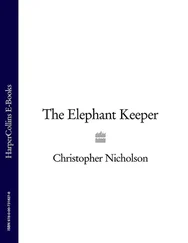Ian MacLeod - The Golden Keeper
Здесь есть возможность читать онлайн «Ian MacLeod - The Golden Keeper» весь текст электронной книги совершенно бесплатно (целиком полную версию без сокращений). В некоторых случаях можно слушать аудио, скачать через торрент в формате fb2 и присутствует краткое содержание. Год выпуска: 1997, Издательство: Dell Magazines, Жанр: Фантастика и фэнтези, на английском языке. Описание произведения, (предисловие) а так же отзывы посетителей доступны на портале библиотеки ЛибКат.
- Название:The Golden Keeper
- Автор:
- Издательство:Dell Magazines
- Жанр:
- Год:1997
- ISBN:нет данных
- Рейтинг книги:4 / 5. Голосов: 1
-
Избранное:Добавить в избранное
- Отзывы:
-
Ваша оценка:
- 80
- 1
- 2
- 3
- 4
- 5
The Golden Keeper: краткое содержание, описание и аннотация
Предлагаем к чтению аннотацию, описание, краткое содержание или предисловие (зависит от того, что написал сам автор книги «The Golden Keeper»). Если вы не нашли необходимую информацию о книге — напишите в комментариях, мы постараемся отыскать её.
is just out from Harcourt Brace, and his short story collection,
, will be out soon from Arkham House. In a departure in style and setting from his previous
tales, Mr. MacLeod takes us to an eerie time and place for a terrifying glimpse of…
.
The Golden Keeper — читать онлайн бесплатно полную книгу (весь текст) целиком
Ниже представлен текст книги, разбитый по страницам. Система сохранения места последней прочитанной страницы, позволяет с удобством читать онлайн бесплатно книгу «The Golden Keeper», без необходимости каждый раз заново искать на чём Вы остановились. Поставьте закладку, и сможете в любой момент перейти на страницу, на которой закончили чтение.
Интервал:
Закладка:
The Golden Keeper
by Ian R. MacLeod

Illustration by Steve Cavallo
My grandmother once told me that she witnessed the last ritual murder to occur in Rome. A young Vestal who had broken her vows was forced to watch the flogging to death of her lover before she was buried alive.
I was only a child then, living in the high house that has been my family’s since the days of the Republic. Of course, I was curious. A few days later, I walked along Vicus Iugarius to the Forum. But what I found in the corner of the great square where my grandmother claimed to have stood hugging the folds of her nurse’s cloak were sightseers harangued by barking orators as they thronged amid the stalls of moneylenders, flower-vendors and trinket sellers. On that day, even the Temple of the Vestals resembled a building site, with fresh marble decorations being chiseled as a statue to a Head Vestal was prepared for erection.
Still, in my innocence, I pressed my ear to the paving, imagining that I might still hear the Vestal woman’s pleading screams as the newly turned soil filled her mouth above all the passing roar, perhaps even the flack of leather against her lover’s flesh. I only found out many years later that unchaste Vestals were in fact immured within niches of the temple and left with a small supply of bread and water, although that still seems a strange kind of mercy.
Knowing the time that has passed since such practices took place, I wonder now if the tale is not one that my grandmother herself heard in her own youth, and passed down to me as if it were her own memory. But I remain sure that she intended it as some sort of lesson; which is why the tale returns to me now, when the sweeter ones with which she comforted my nights are forgotten. For I know now that even gods themselves may crumble with the dust of those who had served them. It even seems to me that the sacred fire of the Vestals will one day go out, and that the grand monuments and porphyry busts that our Emperors erect to themselves and their patron deities in the Forum will become nothing but tumbled blocks of masonry, the meaning of which men in some lost future time will argue over.
Here, in this new posting after my long journey up the Nile, I am surrounded by dead gods, old stone, dispossessed memories. I made detours at Heliopolis and at Memphis and again at Thebes to see some of the so-called splendors about which Herodotus and many others have written. Perhaps seven hundred years ago the efforts of these decadent and barbarous people to maintain the remnants of their history were more successful. For the most part, all I found were lopsided blocks of stone more like mountains than any work of man, broken pot shards, giant sand-buried heads and a few soot-stained tunnels that roared with flies as you entered them, and reeked of ordure and piss. The guides were generally stooped, wall-eyed, jabbering on about Isis and Osiris as if they imagined that such things were still the fashion in Rome. Frankly, I regret paying them. I should have made my passage down the Nile with more speed, the sooner that my year’s work here might be ended.
The Colossi at Memnon were the only monuments that in any way lived up to their promise. I visited them at dawn by raft just as the spring floods were abating, and they truly rose huge from the shining marsh. As is the custom, I pressed my ear to the graffitied stone to hear the marvel of its groaning. The other sightseers I was with professed disappointment, yet I must record that I heard—or at least thought I heard—something. A sound that came not so much from the enormous statues themselves as from the earth beneath them. The sound of an agonized wind. Shrill, high-pitched, echoing with the blood howl of some distant, terrible memory.
Let me describe myself to you now in what I intend will long remain the privacy of this journal. Let me imagine that these loose scraps of papyrus will be gazed at on some distant day by civilized eyes—and then understood, for I know that I make a poor scribe despite the efforts of my teachers.
I am Lucius Fabius Maximus. I was born thirty-three years ago in that high house in Rome. I have trained, reluctantly and at the bidding of my father, as an accountant in the class of Germanicus, and have since practiced with even greater reluctance in the Province of Sicily—and, it must be said in these days of dubious currencies, to little financial gain. On my father’s recent death and with the slates of my family house falling, and our beloved villa above the sea at Naples becoming a ruin, I have been forced to volunteer for service overseas.
I must say that the thought of Egypt appealed to me, and I was surprised and flattered when, at the bidding of my patron Servilius Rufus, the Procurator agreed that I should go there instead of some damp bandit-raided fort in Gaul. I had imagined lush wheat fields, lakes filled with flamingos and tall reeds, bright flowers, sporting hippopotami, and tombs and temples filled with sacred treasure. But instead I have been posted here, up beyond Gebel Barkal and the cataracts, beyond the boundaries of our Empire. At the very rim of the world.
The sun here is a hot brand against your shoulder, and soon withers anything that attempts to grow. Yet even the lands of the delta that I passed through on my journey were less appealing to my sight than they had been in my mind. Upper Egypt may still be the grain basket of our Empire, yet it is also muddy, filled with insects, ugly savages, the stench of cattle. At least I can take comfort from the fact that, unlike my immediate predecessor, I have at least not come this far simply to be stricken by fever and sweat out the waters of my life. But I am sure that the bed in my quarters still stinks of him. I must ask, once again, to have it changed.
My dwelling here is a villa of sorts at Cul Holman, a place that once at tempted to become a town. It lies at the neck of a large valley, where the paths and gullies from the hills that form the last rampart against the desert finally join. I am responsible here for the counting houses, the weighing houses, fifty or so scribes, and upward of five hundred slaves. I am assisted in these duties by Taracus, a captain of the VII Cohort in command of two centurions who, whilst of pure blood, has never actually seen Rome. Otherwise, I must rely on Konchab, my slave foreman, and Alathn, my chief scribe. In my household, I also have Henrika, my treasured personal slave, a cook and perhaps a half score of slaves of both sexes; all of them local, and none in their prime.
The land here, east of the river, is heaped over itself in a way that gives the impression, as one first approaches, of soiled linen. The inclines are riddled with deep gorges, sudden drops, the caves of old workings set high on the face of sun-bloodied cliffs. You know even as you stumble across some new vista from the base of a dried-up rill that you will never find it again without the help of guides. Elsewhere, there are many deep pits and heaps of rubble; the remains of earlier delvings for the gold that also brings me here. In this confusing maze, the sun himself often becomes unanchored within the sky. Not only do shadows shift and change so rapidly that a valley may become a ridge as you approach it, but a standing, beckoning figure may turn to a pillar of stone, then a blackened demon, then a man again, before vanishing entirely. The colors are so varied as the hours of the day change—and then again under the moon— that even now I cannot say with any certainty what the true shade of this rock through which the slaves burrow is.
I have a lump of the stuff beside me now on this desk as I write these words. Held close to the lamp, the fresh-broken side has a gleam almost of fish scales. It contains, I imagine, some ore which perhaps contributes to whatever subterranean process it is that produces the gold.
Читать дальшеИнтервал:
Закладка:
Похожие книги на «The Golden Keeper»
Представляем Вашему вниманию похожие книги на «The Golden Keeper» списком для выбора. Мы отобрали схожую по названию и смыслу литературу в надежде предоставить читателям больше вариантов отыскать новые, интересные, ещё непрочитанные произведения.
Обсуждение, отзывы о книге «The Golden Keeper» и просто собственные мнения читателей. Оставьте ваши комментарии, напишите, что Вы думаете о произведении, его смысле или главных героях. Укажите что конкретно понравилось, а что нет, и почему Вы так считаете.












